 |

 Article 1 Article 1
 Article 2 Article 2
 Article 3 Article 3
|
2005 Seattle Weekly Music Awards - Winners
SEATTLE WEEKLY - May 10, 2005
EXPERIMENTAL
SEATTLE SCHOOL
Although the roster of artists, composers, musicians, performers, and pranksters involved in any given Seattle School happening is always in a wonderful state of flux (you might be onstage with them next), the core of the performance art experiment is occupied by Korby Sears, Ben Houge, Mike Min, and Guy Whitmore. Conceived in 2002 as a means of exploring music and sound and their relationships with just about everything else, Seattle School spawned, among other events and ideas, the wildly popular-and wildly wild-Iron Composer series, wherein two local musicians navigate an aural objective/obstacle course while an entire rock club cheers/jeers them on. If you haven't caught the real thing, keep your boob tube on; there's a good chance Iron Composer will be coming soon to a big-time network near you.
LAURA CASSIDY
 |
Songwriters really face the music in iron composer competition
Friday, September 17, 2004
By D. PARVAZ
SEATTLE POST-INTELLIGENCER REPORTER
Link to original article
|
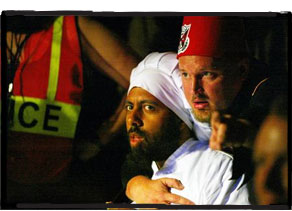 |
Picture this: You have 45 minutes to write a song, which will be judged by a panel of three. You'll be forced to drink alcohol at regular intervals while trying to concentrate. You'll be asked to use random elements from an interview with an audience member for your song.
Pestered constantly by a loud, drunken crowd, you won't be left in peace to compose your work. You can't communicate directly with your band. To top it off, you'll have to perform your song in a goofy chef's uniform at one of the hippest music venues in town.
This is the stuff of sweaty anxiety dreams -- right up there with realizing you're naked at a job interview or late for the one exam that will determine the course of your destiny.
Either that, or it's the Iron Composer competition, a new monthly event at the Crocodile Cafe in Belltown.
|
|
"I have no idea," said Reggie Watts last week in response to what a bona fide musician like him was doing in such a competition. The man is in a real band (Maktub, in case you've been under a rock for the past few years) and has a solo career to boot.
"It was just on my schedule -- it sounded random. And random equals fun," he added. Watts, 32, came to the Croc from a recording studio and had to dash off to a gig at the Mirabeau later that night.
His opponent, Anna Oxygen, 26, seemed bewildered, yet psyched about being there. When asked if she had some sort of strategy for the contest, she said, "No, absolutely none. I purposely didn't try to prepare in any way." She was sporting a tall chef's hat and oversize sunglasses, and like Watts, she was seated next to a "sous chef," who would communicate her song to the band she'd be performing with later in the night.
The brains behind Iron Composer belong to the Seattle School performance group's Mike Min, Korby Sears and Ben Houge (who recently moved to Shanghai). They held the contests at the Capitol Hill Arts Club throughout July, but space needs brought them to the Croc for the current series of monthly contests. Oxygen and Watts were the first to compete as Iron Composers at the Croc, drawing about 200 people on Sept. 16.
|
|
The contest came about because part of the group's residency at the Capitol Hill Arts Center required them to do a progressive show.
"It was just kind of pulled out of the air," said Sears, 35. (Drawing theme and kitsch value from the popular Japanese cooking show "Iron Chef," of course.)
But the thing about ideas that appear out of the ether is that realizing them is still an enormous amount of work: there's a cast and crew, a set, a director, props and, or course, contestants. The result of all the work is total chaos.
"It's not a typical theater show where it's 'here's your seat, here's your ticket, here's where you look,' " said Sears. "It's a 360-degree thing, so you can't see everything. It's impossible. You don't have the bandwidth."
Sears said there's talk of the group producing Iron Composer as a television show, but for now, he's fine with it being a club show.
|
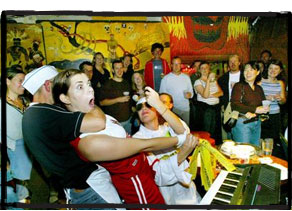 |
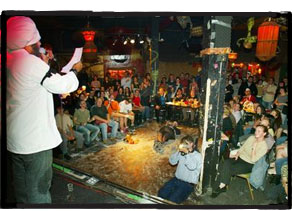 |
Creating something under serious time constraints and chefs' uniforms aside, Iron Composer doesn't have much in common with "Iron Chef."
For one thing, organizers toss five "turmoils" -- or challenges -- into the competition. One turmoil at last week's event was the Buddy Holly Paper Airplane Turmoil, in which the audience made paper airplanes and pelted them at the contestants.
Then there's the drinking. Contestants are required to take five shots of alcohol during the five rounds of the competition. Given that the whole thing takes about an hour, that seems like a lot of booze, but the contestants obliged. Of course, we didn't sniff every shot they drank, so it's possible that some of the shots were water, not vodka. For the sake of their livers, we hope that was the case.
|
|
Chances are, you've never seen the audience so animated and caught up in the moment at the Croc. If you've seen any shows there -- or at any rock music venue in this town -- the order of the night seems to involve the audience standing still, arms crossed, maybe clutching a drink and nodding at the stage. This is how Seattle music audiences typically (not always) show their love.
Not so at the Iron Composer event.
Audience member Jim Brewer was impressed by the organizer's ability to move the Crocodile audience, one he described as being normally non-responsive, involved in the show. "It's enjoyable for the people who are here," said Brewer, 53.
The end result was high-energy, if somewhat crazed. Oxygen's post-punk rap -- with shades of Debbie Harry and Le Tigre -- brought the house down, as did Watt's beat-box intro to his song. But someone had to win, and someone had to lose -- in this case, the winner was Oxygen, and the gracious, smiling loser was Watts.
|
|

COMPOSING INSANITY
With Iron Composer, Seattle School Masters the Monumental Goof
by David Schmader
September 9th, 2004
Link to original article
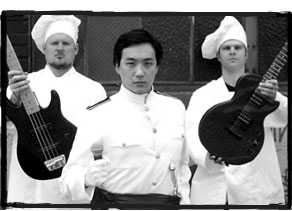
There are good ideas, there are ridiculous ideas, and then there is Iron Composer.
Brainchild of local composers collective Seattle School, Iron Composer takes its cue from the Food Network's culinary battle show, Iron Chef, corralling a slew of the School's most cherished themes--time, discipline, competition--into a "60-Minute Live Songwriting Competition, Drinking Game, and Aural Obstacle Course." The result is a songwriting battle royale of unprecedented diabolicalness--half Fluxus-informed composition experiment, half booze-fueled demolition derby.
Armed with source material drawn from a five-minute onstage interview with a randomly selected audience member, a pair of local entertainment personalities are made to write new songs while besieged by distractions or "turmoils," from the Sheet Music Turmoil (wherein sheet music of crappy artists--Billy Joel, Celine Dion--is wadded up and hucked at the competitors) to mandatory liquor consumption (one shot at the top of each of the five rounds). After 45 minutes, each composer--the competition has in the past included Supersucker Eddie Spaghetti, Alien Crime Syndicate's Joe Reineke, and Tennis Pro's David Drury, among many others--takes it to the stage, banging out his or her brand-new composition with the crack Iron Composer house band.
Even in its earliest incarnation, Iron Composer was a blast (full disclosure: I was asked to judge their first competition)--a fact since confirmed by three packed Iron Composer competitions at the Capitol Hill Arts Center (CHAC). After fielding offers from a half-dozen Seattle venues, Seattle School has set up shop at the Crocodile Cafe, which will host the first of its monthly Iron Composer competitions on September 9, pitting Reggie Watts against Anna Oxygen. But the automatic winners are the pointy-headed goofballs of Seattle School, who've somehow managed the near-miraculous: bringing post-everything experimental composition to the rock-show masses.
Created in 2002, Seattle School was conceived "as a performance group interested in exploring sound and music, primarily in terms of spatial relations, memory, deep time/wide incidence, calculus, communication/notation, and inquiries into the definitions of tone, language, and audience," in the words of the group's founder and primary architect, Mike Min. Less abstractly, Seattle School provided its five members--Min, Korby Sears, Ben Hogue, Guy Whitmore, and Erik Aho--with a natural outlet for radical ideas that rarely had a place in their musical day jobs. (They pay the bills by composing everything from TV-ad soundtracks to film and video-game scores, and Sears does double-duty as "the new guy" on standup bass in the Dudley Manlove Quartet.)
After settling on a name ("Seattle School was meant to suggest a school of thought, like Bauhaus," says Sears) the group began performing publicly in 2003, quickly incorporating their shared obsessions--described by Sears as "time, competition, and orchestrated failure"--into a series of distinctively twisted works. In Competition & Distraction, Min sought to capture the menace of the D.C. sniper attacks in the Polestar Gallery, requiring three of his School mates to perform competitive karaoke onstage while he shot them with paintballs from the back of the house for "breaking the rules in his head." In Relay (also at Polestar), Hogue used random radio snippets to spark an ever-tightening chain of repetition, with participants forced to interact increasingly more intimately until the whole thing dissolved into chaos and applause. "It's like a sporting event," says Sears.
But the Iron Composer concept started with raw meat.
|
After a year and a half of distinctively brainy, increasingly popular performances at a variety of Seattle venues, Seattle School accepted a residency at CHAC, which handed over its downstairs space to the five-member group for the month of July. The relationship progressed well until CHAC learned that the School's resident performance--an ambitious, free-wheeling cabaret show called Madlib MaCabaret--would feature that fundamental staple of performance art, raw meat. With CHAC's popular in-house bistro, Crave, set to debut its vegetarian menu the weekend of the show's opening, CHAC's managers lamented the "harmonic dissonance" the School's raw meat would create, and urged its resident artists to reconsider.
"They wanted us to use fake meat," says Sears over drinks at Bush Garden. "But we had moral issues with the switch." The meat, Sears explains, was to have been cooked and eaten over the course of the show, with its ritualized consumption meant to symbolize the transference and purging of pain. Symbolically, the ritual would fall flat with Tofurkey.
Refusing to sacrifice its artistic vision, Seattle School stuck to its principles and canceled the show, set on filling the vacancy with something new. With three weeks before opening, Sears and Min "pulled the idea for Iron Composer out of our asses," says Sears.
Nothing could prepare Seattle School for the howling mania that greeted what their asses had produced; audiences gamely surrendered themselves to the diabolical Iron Composer roller coaster. "Everyone talks about how Seattle audiences are lame, but our audiences have totally gotten into it," says Sears, who's overseen such crowd actions as the Composer Stare-Down (wherein the audience encircles the night's composers, at whom they stare silently for two minutes) and the instant Make-Out Party, wherein the lights go down, Donna Summer's "Love to Love You, Baby" comes up, and people are instructed to mash.
Thanks to a roster of competitors drawn predominately from Seattle's music scene, Iron Composer has found a natural home in the rock world, an arrangement that should continue to flourish at the Crocodile. "People keep coming back, so we have to keep coming up with surprises," says Sears, who guarantees no two Iron Composers will ever be alike by rigging each show with fresh turmoils and, of course, new contestants. Following this week's Watts vs. Oxygen showdown, the coming months will bring such luminaries as Kurt Bloch, Lesli Wood, Robb Benson, and Heather Duby to the Iron Composer ring.
Asked to name dream contestants for the future, Sears answers without thinking: "Steve Fisk, Calvin Johnson, Neko Case... and while I'm fantasizing, let's throw in Danny Elfman and [XTC's] Andy Partridge."
|

STRANGER 2004 GENIUS AWARDS - ARTS ORGANIZATION
SEATTLE SCHOOL
A Collective With a Rich History of Ridiculous Ideas
by David Schmader
October 14th, 2004
Link to original article
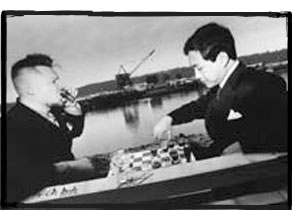
When it came time to consider worthy arts organizations for this year's
Genius Award, Seattle School's name came up and never went away. The local
composers' alliance scored an unlikely hit this summer with the live-action
songwriting competition Iron Composer--part Fluxus-informed composition
experiment, part booze-fueled demolition derby--in which a pair of
songwriters raced to compose and perform new songs in one hour while
adhering to a strict drinking schedule (one shot every nine minutes) and
being tormented by the audience. In one instance, audience members were
given sheet music by crappy musicians--CÚline Dion, Billy Joel--which they
wadded up and threw at the songwriters as they worked.
Iron Composer was a thoroughly ridiculous idea from a group with a rich
history of ridiculous ideas. In Paint, Fear, Karaoke, and Paintball, three
Seattle School members--nearly all of whom pay the bills composing scores
for video games--stood on stage performing simultaneous, competitive karaoke
while Schoolmate Mike Min shot them with paintballs for "breaking the rules
in his head." Min's solo composition Cockblocker found the West Point
graduate dropping his pants and repeatedly punching himself in the crotch as
hard as he could. Other works have highlighted the School's more serious
side: The group won raves for Grapefruits, a production of Yoko Ono's
little-seen Fluxus-inspired work of the mid-'60s. But with Iron Composer,
Seattle School achieved the near-miraculous: forging an unprecedented
alliance between experimental composition and rock 'n' roll mayhem. (This
fact was underscored last month when Seattle School launched a new series of
Iron Composer shows at the city's most beloved local rock venue, the
Crocodile Cafe.)
|
Seattle School's genius is for diabolically crossbreeding braininess and
brazen theatricality--seizing the elements that make live theater unique
while rejecting the elements that make so much live theater deadly. "These
guys know their stuff," said Lita Gratrix, who appeared in Seattle School's
Fear, Karaoke, Discipline, and Paintball and Grapefruits. "Having a
conceptual background and framework on which to hang their pieces is what
makes the difference between Seattle School and so much of the other
(crappy) performance art that's out there."
As Stranger columnist Christopher DeLaurenti describes it, "The collective,
confrontational genius of Seattle School resides in their ability to mash up
their multifarious musical heritage--classical tradition, pop music,
text-sound composition, improvisation, Fluxus, and pure vaudevillian
chicanery--into a distinctive, entertaining, and sometimes destructive
whole. Time will tell if the individual composers of Seattle School turn out
to be geniuses, charlatans, or something in-between, but right now they're
following the grand tradition of composer/performers, from before
Rachmaninoff and Stravinsky on through to Steve Reich and Bernhard Gal.
Rather than wait 20 years for another generation of musicians to grow up and
get brave enough to try pieces like Study for Air Guitar or Music for
Clothing, Seattle School dares to do it themselves."
There may be needier organizations, but there are none to whom we'd rather
give $5,000, if only to see what the hell happens. For more insight, we turn
to the two men at the heart of Seattle School--Mike Min and Korby
Sears--interviewed here by Bret Fetzer:
Korby Sears
Age: 35
Place of birth: Houston, Texas
Years in Seattle: Almost 10
What's the least beautiful sound in the world?
Somebody calling me up for work. I hate the sound of work. How about a cell
phone call?
|
So is your goal with Seattle School to avoid work for as long as possible?
I've pretty much whittled my lifestyle to a very meager existence and it
works fine. So if I could eliminate more work, that'd be great.
Does it bother you that Seattle School's initials are SS?
The initials bugged us at first, but maybe we can make it our own so that no
one thinks we're the police for the Nazis, which we are not. There's also
some confusion of Seattle School with the school district. I'm trying to see
how I can use that to my advantage. People have asked us, "What school's
performing? Roosevelt? They have a good program. Garfield? That's great!"
What sparked your interest in this neo-Dada/Fluxus direction of art?
I grew up in Dallas. It's freaking huge, and yet the sense of public space
is terrible. There're no public parks, it shuts down at night, there's no
downtown, it's all suburbs. The idea of grabbing people and, without saying
anything, getting them to do something, was kind of what I wanted to do as a
kid. There was also Abbie Hoffman, an idol of mine. He set up situations
where he steps back and the truth just occurs. It's indeterminate--Iron
Composer has a lot of that too--you set it up, you step back. Whatever
happens, happens.
Mike Min
Age: 32
Place of birth: Seoul, Korea
Years in Seattle: Too many to count
What's the most beautiful sound you can think of?
Oh, is it gonna?... Oh my god, I don't have--it's like Actors Studio
questions! I'll go with the stock John Cage answer: Silence.
You seem to lean a great deal on John Cage. Do you have any original
thoughts?
Good artists borrow, great artists steal. And I'm aiming to be the greatest
artist of all time.
You used to be in the Army.
I was doing military intelligence for three years. There's a decision that
you make when you're 18 and it kind of haunts you--but it was a great
experience.
Do you think that your military discipline has helped you in your pursuit of
neo-Dada art?
My military discipline has a lot to do with my sense of humor. I don't know
if it has anything to do with the neo-Dada stuff, but I love neo-Dada stuff,
I can't help it! I'm self-aware that I'm Dada, but I can't help it.
Isn't that very un-Dada, to be self-awarely Dada?
But it's very Dada to do it anyway.
Assuming that you were outrageously modest and felt that Seattle School
didn't deserve this award, whom would you give it to?
It's really a toss-up. Seattle has such a great scene full of good, hearty
things. Genius, I don't know. Genius. [Min flails verbally, making
incoherent syllables for a moment.] This money's going to be so awesome,
though.
What are you going to spend it on?
Expanding Iron Composer to pop greatness. That's the goal. To make it into,
like, this completely syrupy super-pop behemoth that's full of corporate
sponsorships and pseudo-edginess, then sell it out so we can do all of our
real stuff later.
|
|
 |
